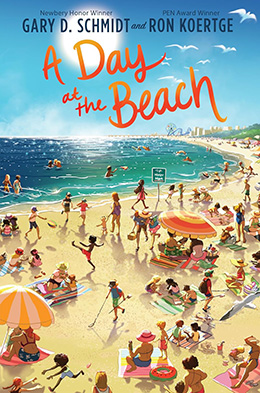Avi’s 2025 Summer Blog Series
Gary D. Schmidt
From Avi: As I have for the last three summers, (summer of 2024, summer of 2023, summer of 2022) I’ve invited 13 admired authors to write for my blog for the next three months. I hope you’ll tune in each Tuesday to see who answered this year’s question, which we hope provides you with inspiration. And by the end of the summer, you’ll have new authors to follow!
What’s your favorite strategy for encouraging young people to read?

How to Encourage a Kiddo to Read
In middle and high school, I played — or tried to play — trumpet for the school bands. It was not my first commitment, or even my second — and I suppose it showed. When I think back on those years now, a half-century later, I’m not sure I can name or even remember a single piece of music that we played for all the concerts in which we were forced to participate. I do remember long rehearsals, sometimes on weekends, and the boredom of listening to the clarinets, or the flutes, or the percussion, working on their ensemble play while everyone else waited — me, with an open book on my stand until the trumpets were called upon to try their hands at a few measures.
Except for one piece.
I do not recall the name of the band leader; I wish I did. He was not our regular conductor. But at the beginning of one rehearsal, he handed out photocopied sheets to us of handwritten music for a piece he had composed. On the clear staffs of the sheets, he had hand drawn the notes for his music, which was a piece he was submitting for publication, and he needed our band to create a recording. It was still untitled, it was that fresh, but I remember the music was meant to simulate the response of astronauts who had landed on a planet and were encountering its native life, which tended to squelch and glug and gurgle through the wet and muddy landscape, a sound simulated by a recording he had made with electronic sounds. Most of the rehearsal was about matching the timing of the band to the timing of the electronic sequences—which turned out to be impossible and which led to our eyewitness experience of a musician adapting his score on the spot.
We never did hear the response of the publisher to the piece, but for me, at least, it didn’t matter. I was impressed and thrilled by the idea that one of our teachers was composing his own music and sending it in to become a published piece. I had never met anyone who would dare to do such a thing — he was that serious, that committed about his art. I wondered, looking at the hand drawn notes, if I would ever do something like that — not write a piece of music, but write a work of fiction that I would dare to send in some day. Could I ever be that committed about my own art? Would I dare to disturb the universe in the way that that conductor had done?

I understand that there are many effective approaches to encouraging middle grade and YA reading, and that many of these can go to war against the prevailing cultural lethargy that has allowed kids to believe that reading is unimportant. (A neighboring kiddo of mine who has gone on to become the president of his real estate corporation once bragged to me on the day of his high school graduation that he had made it through the last four years without reading a single book. He meant to impress me.) But I wonder truly if one of the huge enticements to reading might simply be to model it — that kids might be encouraged to read because they see the adults in their life reading: a parent, a grandparent, an aunt, a teacher, the employer encountered in a high schooler’s first job, the religious instructor, the neighbor on her porch, the carpooling adult or the school bus driver who throws a paperback on the dashboard, the scout leader, the cafeteria lady waiting between shifts, the principal, the librarian, the pastor or rabbi.
I recall my fourth-grade teacher, Mrs. Harknet, who kept books on her desk that were not teacher books, aimed at the job. They were novels, and she read them during breaks — or during our reading — and sometimes she’d chuckle, or laugh out loud, or go to the board and write down a word or a phrase she’d just read. She obviously loved reading, and it made me—a poor reader in fourth grade — want to love it too. I remember Mr. Ainsley, our world history teacher, reading with a lead pencil in his mouth, which he would sometimes retrieve to underline some passage. When we asked what he was reading, he would always answer “Herodotus,” or “Thucydides,” or “Tacitus,” and sometimes he would stop and read passages written two thousand years ago — and he made them thrilling.
My band teacher’s commitment to his art was an inspiration to me, and I thought of him when I began to dare to try my own hand at something I might someday send to a publisher. And it is unquestionable that the readers whom I met along the way, committed readers who understood and enjoyed the art of reading, were models — are models — to my own commitment to reading, which is the basis for my love of writing. So when I hear these days that high school students don’t read Catcher in the Rye anymore because — wait for it — it’s too long, or that The Great Gatsby is now being taught by having kids read the first two chapters, followed by a summary of the rest of the book, how can anyone not recognize that something terribly important has been lost: the possibility that someone might be taken up by the language and plot and characterization of a great novel. It is almost as if we cannot imagine that that might be true.

Do we want our kids to read? Model it. Let them see you read. Create spaces for your kids to read, and don’t take that time yourself to fill in busywork; read yourself. Bear witness to your reading: Let them know what you’re reading and why you like it. Take up the technique that I’ve seen many teachers use these days of listing the book(s) you’re reading underneath your signed name in any email you send. Lend books generously. Surprise a kiddo with a suggested title: “I just finished this over the weekend and I think you might really like it.” Carry the book you’re reading openly, if only to rebuke those now ascendant in our culture who disdain reading. Dare to believe that this small, seemingly tiny act might change a kid’s life. It did for me.
Wordsworth, in his autobiographical “Prelude,” suggested that “what we have loved, others will love, and we will teach them how.”
Teach them how to read, because you love to read. Really, how else do you think it’s going to happen?
Particulars
Gary D. Schmidt is the bestselling author of The Labors of Hercules Beal; Just Like That; National Book Award finalist Okay for Now; Pay Attention, Carter Jones; Orbiting Jupiter; the Newbery Honor and Printz Honor Book Lizzie Bright and the Buckminster Boy; and the Newbery Honor Book The Wednesday Wars. Gary lives in rural Michigan.


2 thoughts on “2025 Summer Blog Series: Gary Schmidt”
YES!!!!!!!!!!!!! “Do we want our kids to read? Model it. Let them see you read.”
This series of blog posts about encouraging reading inspires me as a pre-published MG mystery writer of family stories and as a retired librarian sharing books with young readers in middle school and high school. I’m interested in reaching my target audience, who I want to love reading as much as I do. Thank you to Avi and Alan Gratz for alerting me to this great advice series by my favorite exemplary and sharing authors!